|
|
|
Sort Order |
|
|
|
Items / Page
|
|
|
|
|
|
|
| Srl | Item |
| 1 |
ID:
095018
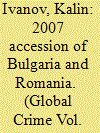

|
|
|
|
|
| Publication |
2010.
|
| Summary/Abstract |
For both objective and subjective reasons, the European Union devoted unprecedented attention to the problem of corruption in Bulgaria and Romania. The European Union (EU) faced a complex challenge in wielding its arsenal of carrots and sticks to encourage reform in the two countries. Conditionality was further complicated by rivalries between Sofia and Bucharest. Despite its limits, EU pressure presented a rare opportunity to depoliticise anti-corruption policy. After accession, Romania regressed from its previous achievements against corruption, and Bulgaria remained reluctant to prosecute senior officials or confront organised crime. Nevertheless, the European Commission continued its monitoring activities, and its ability to freeze funds maintained a modicum of pressure for reform. More effective anti-corruption efforts are possible if a domestic constituency for reform gains sufficient momentum to replace the EU's waning influence.
|
|
|
|
|
|
|
|
|
|
|
|
|
|
|
|
| 2 |
ID:
095021
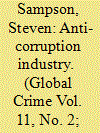

|
|
|
|
|
| Publication |
2010.
|
| Summary/Abstract |
This article describes the concept of 'industry', often used pejoratively in critiques of international development, and applies it to the field of anti-corruption. The characteristics of the anti-corruption industry, including anti-corruptionist discourse, resemble that which has taken place in development aid, human rights, civil society and gender equality. The anti-corruption industry thus includes key global actors, secondary actors who look for 'signals' and an apparatus of understandings, knowledge, statistics and measures, all of which tend to prioritise anti-corruption institutions over anti-corruption activism. It is argued that the questionable impact of anti-corruption programmes enables the anti-corruption industry to coexist along with the corruption it ostensibly is combating. Instead of viewing anti-corruption as hegemonic, we need to critically examine the consequences of the global institutionalisation of anti-corruptionist discourse and anti-corruption practice.
|
|
|
|
|
|
|
|
|
|
|
|
|
|
|
|
| 3 |
ID:
095019
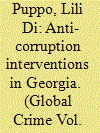

|
|
|
|
|
| Publication |
2010.
|
| Summary/Abstract |
The article aims at analysing the transfer of anti-corruption norms and standards as well as the instrumental use of anti-corruption efforts in Georgia. Drawing on the literature on anthropology and development, I use Georgia as a case study to analyse how an anti-corruption discourse is translated into local agendas. In the first part, I analyse three different perspectives on the fight against corruption in Georgia. In the second part, I examine three different types of anti-corruption interventions to illustrate the various agendas pursued by actors in the anti-corruption field. First, I study the implementation of the national anti-corruption strategy as an example of a conflict between two actors (government and international organisation) to assert the pre-eminence of a particular anti-corruption expertise. Second, I examine the reform of the Chamber of Control of Georgia (CCG), in particular the confrontation between the CCG and the Ministry of Education (MoE) in 2007, as an example of how an external anti-corruption agenda is adapted to local political struggles. Third, I analyse civil society anti-corruption projects as examples of the attempt to maintain a particular donor discourse.
|
|
|
|
|
|
|
|
|
|
|
|
|
|
|
|
| 4 |
ID:
119918
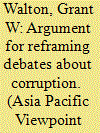

|
|
|
|
|
| Publication |
2013.
|
| Summary/Abstract |
There have been few attempts to identify the way different perspectives of corruption are employed in Papua New Guinea (PNG). The paucity of such analysis makes it difficult to identify the way scholars and policy-makers understand corruption in the country, in turn leading to potentially poor targeting of anti-corruption programmes. This article categorises perspectives of corruption that are found in academic and policy accounts of PNG. It finds that this literature is marked by an over-reliance on 'mainstream' Western interpretations of the definition, causes and solutions to corruption. In turn, it is argued that there is an important role that 'critical' and culturally aware academics can play in reframing debates about corruption in PNG and the Pacific.
|
|
|
|
|
|
|
|
|
|
|
|
|
|
|
|
| 5 |
ID:
095013
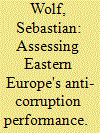

|
|
|
|
|
| Publication |
2010.
|
| Summary/Abstract |
This article compares the results of Council of Europe and Organisation for Economic Co-operation and Development (OECD) anti-corruption monitoring reports to two Transparency International instruments, the Corruption Perceptions Index and the OECD Anti-Bribery Convention Progress Report. It constructs and applies a simple typology (four-cell matrix) consisting of the combinations of good/deficient implementation of international anti-corruption provisions and high/low level of perceived corruption. As the sources and the comparative method used cannot prove causality, the article introduces three ideal types of interpretation to discuss the relevance of the anti-corruption regulatory framework in both domestic and cross-border anti-corruption policies. In the conclusion it is argued that there is a specific Eastern European pattern of anti-corruption performance that implies a need for new strategies.
|
|
|
|
|
|
|
|
|
|
|
|
|
|
|
|
| 6 |
ID:
113922
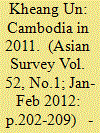

|
|
|
|
|
| Publication |
2012.
|
| Summary/Abstract |
Cambodia's economy in 2011 recovered from the global economic downturn with a rise in garment exports. Hun Sen and the ruling Cambodian People's Party further consolidated power via the exercise of rule by law and patronage politics. Relations with Thailand returned to normal; ties with China strengthened with increased assistance and trade. The Khmer Rouge Tribunal proceeded amid allegations of political interference by the Cambodian government, making the further expansion of indictments unlikely.
|
|
|
|
|
|
|
|
|
|
|
|
|
|
|
|
| 7 |
ID:
138092
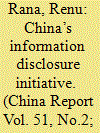

|
|
|
|
|
| Summary/Abstract |
This article examines the initiatives taken by the government of the People’s Republic of China towards ensuring government information transparency. The Open Government Information Regulations (OGI) which was adopted in 2007 is a landmark in the transparency reforms process in China. The analysis of this initiative and further reforms becomes vital as China has witnessed newly emerged emphasis on anti-corruption campaign and rule of law. Though these regulations were adopted in 2007 at national level, many reforms have been introduced in these regulations in terms of annual guidelines from time to time. This article analyses the origin and development of OGI; the scope of these regulations; the legal, political and structural problems obstructing the successful implementation of these regulations; and further reforms towards making China more open and transparent. This work also provides a comparative analysis of information disclosure initiatives in China and India.
|
|
|
|
|
|
|
|
|
|
|
|
|
|
|
|
| 8 |
ID:
141091
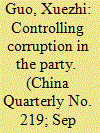

|
|
|
|
|
| Summary/Abstract |
This article investigates a prominent but little discussed CCP central organ, the Central Discipline Inspection Commission (CDIC), and its local discipline inspection commissions (DICs) in the post-Mao era. It analyses how the CCP exerts its control over the disciplinary organizations and argues that the disciplinary agencies' lack of autonomy hinders their efforts to crack down on corruption. This article investigates the important role played by the CDIC in CCP politics by examining its organizational structure, modes of operation and criteria for imposing disciplinary sanctions, and evaluates the measures and approaches employed by the Party's disciplinary organizations to combat corruption. The study concludes that structural, institutional and cultural factors hinder the effectiveness of the CCP's disciplinary agencies in their efforts to control Party members, officials and corruption.
|
|
|
|
|
|
|
|
|
|
|
|
|
|
|
|
| 9 |
ID:
095020
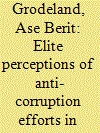

|
|
|
|
|
| Publication |
2010.
|
| Summary/Abstract |
Anti-corruption efforts introduced in Ukraine in recent years have predominantly been imposed from the outside. They have been vague, all-inclusive and lacking in political and public support. What is more, they have been fairly insensitive to the cultural context into which they have been introduced. While targeting corrupt behaviour, they have largely ignored its root causes. The impact of Ukrainian anti-corruption reform has therefore been limited. Drawing on extensive qualitative data from Ukraine, this article explores elite (i) perceptions of Ukrainian anti-corruption reform, (ii) familiarity with specific anti-corruption initiatives, and (iii) views on how best to combat corruption. Not surprisingly, Ukrainian elites are familiar with, and fairly negative in their assessment of, national anti-corruption reform. They advocate a number of measures targeting corrupt behaviour as well as its root causes with a view to reducing corruption in Ukraine".
|
|
|
|
|
|
|
|
|
|
|
|
|
|
|
|
| 10 |
ID:
101948
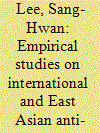

|
|
|
| 11 |
ID:
095016
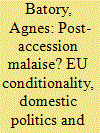

|
|
|
|
|
| Publication |
2010.
|
| Summary/Abstract |
Corruption in the then candidate countries of Central and Eastern Europe was a major concern for the European Union (EU) before its 2004 enlargement. This concern and its expression in the conditionality of membership constituted strong incentives for the candidate countries' governments to control corruption - or more precisely to take control measures that could be communicated to the European Union. A common assumption in the literature is that with the removal by accession of these incentives anti-corruption efforts would not be maintained at their pre-accession level. But is this really the case? Or have other influences from international organisations, domestic politics or civil society taken over to provide impetus for further corruption control interventions? This article considers these questions with respect to Hungary and finds that while some of the post-2004 measures have been a response to the country's international commitments, there have also been important domestic sources of reform. The results are, however, limited: despite the country's relatively smooth path to the European Union, membership of all the major international legal instruments and three major reform packages since 2000, corruption seems no less prevalent than it was a decade before.
|
|
|
|
|
|
|
|
|
|
|
|
|
|
|
|
| 12 |
ID:
154935
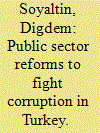

|
|
|
|
|
| Summary/Abstract |
This article examines the practical application of legal reforms to fight corruption in Turkey, focusing on three policy sectors: civil administration, public finance management and public procurement. Facing increasing pressure, incumbent governments have adopted international anti-corruption norms and programs in the last two decades. However, the adoption and adaptation of formal institutions tends to remain decoupled from informal behavioral practices, thereby curbing the effectiveness of Europeanization in the Turkish public sector – albeit to varying degrees. The policy comparison of this article shows that external anti-corruption efforts, especially those initiated by the EU, can help domestic actors to address the problem of decoupling when certain domestic factors are present.
|
|
|
|
|
|
|
|
|
|
|
|
|
|
|
|
| 13 |
ID:
115261
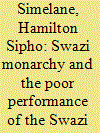

|
|
|
|
|
| Publication |
2012.
|
| Summary/Abstract |
One of the major problems that has faced African countries since political independence has been continued poverty that has affected the lives of the populations of the countries. While there are numerous issues behind African poverty, corruption has emerged as one of the critical drivers. To address the problem of corruption African governments have been forced to experiment with different strategies, one of which has been the establishment of anti-corruption agencies. Swaziland is one of the African countries that has a huge problem of corruption, and has responded with the formation of an anti-corruption agency. However, since its inception, the agency has failed to operate effectively and corruption has continued to rise. This paper highlights the problem of corruption in Swaziland and the steps taken to curb it. The paper shows that the legal framework and the agency created to combat corruption have failed to yield the desired results, and continues to provide a critical analysis of such failure. It argues that the main issue behind the failure of the agency is royal absolutism wherein the Swazi monarchy has not only become a location of corruption but also perpetuates the scourge through protecting some influential people engaged in corrupt activities.
|
|
|
|
|
|
|
|
|
|
|
|
|
|
|
|
|
|
|
|
|